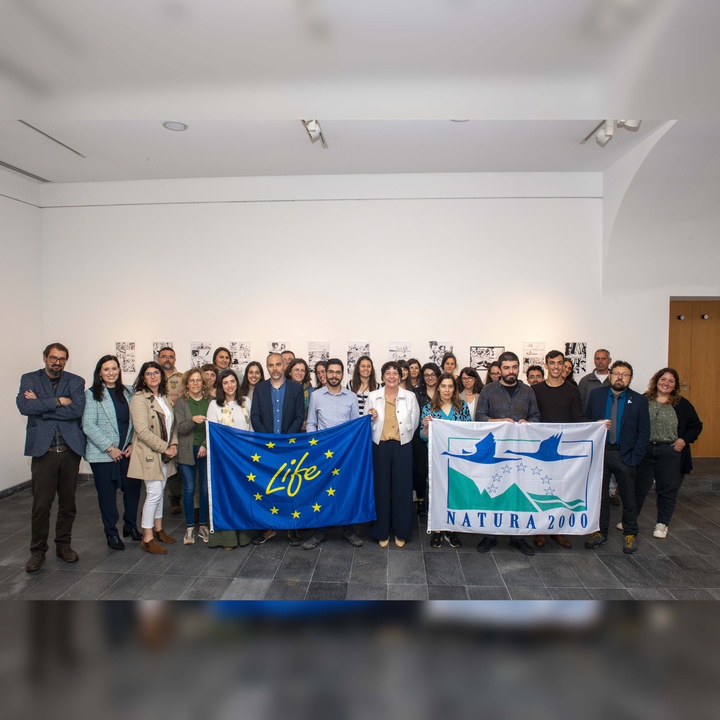Text size:
News

The Regional Secretariat for the Environment and Climate Change promoted the Final Conference of the LIFE VIDALIA project
May 4, 2023
The Regional Secretariat for the Environment and Climate Change promoted the Final Conference of the LIFE VIDALIA project – Valorização e Inovação Dirigidos à Azorina e Lotus nas Ilhas Açorianas, last April, at the João José da Graça Public Library, on the island of Faial.
The LIFE VIDALIA project, co-funded by the European Union through the LIFE Programma and coordinated by the Regional Secretariat for the Environment and Climate Change, acts at the level of conservation of two endemic flora species of the Azores: Azorina vidalii and Lotus azoricus, in several areas of intervention distributed across the islands of Faial, Pico and São Jorge, through the protection and restoration of their natural habitats.
The Regional Secretary for the Environment and Climate Change, Alonso Miguel, said that “this event marks the end of a project that is a relevant milestone in terms of nature conservation and environmental education and awareness”, stressing that “although the project ends this year, its continuation will be ensured by the Regional Secretariat for the Environment and Climate Change, with the implementation of the post-LIFE through the LIFE IP AZORES NATURA project”.
The conference included a lecture by Frank Vassen, Team Leader of the Directorate-General for Environment of the European Commission, where were addressed the theme of conservation of endemic European flora, the role of LIFE programmes, and the future goals for 2030 in nature conservation.
The LIFE VIDALIA project management team presented a video about the project, as well as the objectives achieved in the project's intervention areas, with emphasis on the expansion of the Rare Plant Nursery of the Faial Botanic Garden, the optimization of the propagation of the project's target species, exceeding the values initially planned for the project, as well as the effectiveness of actions and techniques for controlling invasive species of fauna and flora, some of which subsequently adopted by other projects based on the knowledge developed by the LIFE VIDALIA project.
As part of the promotion of knowledge exchange with other projects and as a result of the synergies established, representatives of other LIFE projects were also invited to speak, with different objectives and areas of intervention, such as the LIFE IP AZORES NATURA project, coordinated by the Regional Secretariat for the Environment and Climate Change, with the conservation of habitats and species included in the Natura 2000 network and respective intervention areas on the Azorean islands, the LIFE DUNAS project, with an area of incidence of adaptation to climate change on the island of Porto Santo and the LIFE SEEDFORCE project, with the use of seed banks to restore and strengthen native plants in danger of extinction in Italy.
Later, the “Plant a Tree” Association addressed the volunteering actions already developed in the Autonomous Region of the Azores, in conjunction with the LIFE projects, promoting excellent interaction between young people and the conservation of Azorean nature.
“Nature conservation and the protection of biodiversity require high investment and high levels of technical and scientific knowledge, and in this regard, the Region has been able to rely on the Community instruments currently available, especially the LIFE projects, which are truly strategic operational and financial instruments for the Azores,” said Alonso Miguel.
“There are currently five LIFE projects underway in the Region, coordinated by the Regional Secretariat for the Environment and Climate Change, which represent an investment of about 45 million euros, of which four are nature conservation and biodiversity preservation projects, and one directed to the mitigation and adaptation to the effects of climate change,” added the Regional Secretary.
The Final Conference of the LIFE VIDALIA project, which counted about 100 national and international participants (in online and in-person format), ended with an acoustic concert with Vidália, who curiously chose the name of the band after getting to know the LIFE VIDALIA project, and for having identified the Azorina vidalii as a cherished and characteristic symbol of the Azores.

